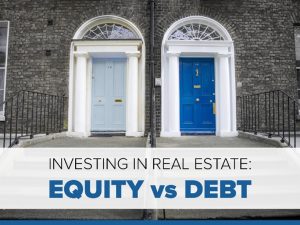When looking into real estate opportunities, often an investor will be evaluating debt and equity offerings. Investopedia has created a comprehensive comparison of the pros and cons to debt and equity real estate investments.

Debt Investments
These investments involve an entity or fund lending on behalf of the investor to the property owner with their shares being proportionate to the amount invested. Returns are realized based on the interest rate of the loans.
Pros
Consistent Cash Flow: With predictable interest rates, costs and payment schedules, debt investments typically provide consistent cash returns to investors monthly or quarterly. Return amounts vary based on the risk of the underlying asset.
Lower Risk: The loan is secured by the first position lien on the property, which acts as insurance against failure of repayment. In the event of selling for a loss or default, debt investors receive payment first and can recoup their investment through foreclosure if needed.
Shorter Hold Period: Debt investments typically have hold periods of 6 months to 2-years as they are often tied with development or fix and flip projects.
Cons
Capped Returns: Returns are limited by the interest rate of the loan. Investors are sacrificing larger potential returns in exchange for mitigated risk.
Exposure to Prepayment Risk: Borrowers can prepay off their loans, causing investors to need to replace their planned cash flow earlier than expected. For open ended debt funds, like the ZINC Income Fund, this is not an issue as returned capital is used for the next loan in the fund.
Equity Investments
These investments involve ownership shares in a property or fund that is proportionate to the amount invested. Returns are realized from excess cash from operations and appreciation upon sale.
Pros
No Cap on Returns: Due to owning the property, investors not only receive the excess cash flow from operations, but also their share of the appreciation upon sale. With rents and sale prices not capped, investors can profit based on how successful the operations and sale of the property or fund is.
Tax Benefits: Ownership in property, even if through an LLC investment, allows for certain expenses to be deducted including depreciation and the cost of repairs.
Cons
Higher Risk: If a property or fund fails to deliver on projections, equity investors are second in line to debt investors to receive payback of investment.
Longer Hold Period: Equity investments typically have hold periods of 3- to 10-years, with extremely limited liquidity.
Each investment type, real estate debt and equity, have their pros and cons. Understanding the type of investment that fits your risk return profile best will help you achieve your financial goals.
If you are interested in learning more about an investment in the ZINC Income Fund to start earning your approximate 8% yield, CLICK HERE to request the fund’s offering documents or contact us directly at 559-326-2509.